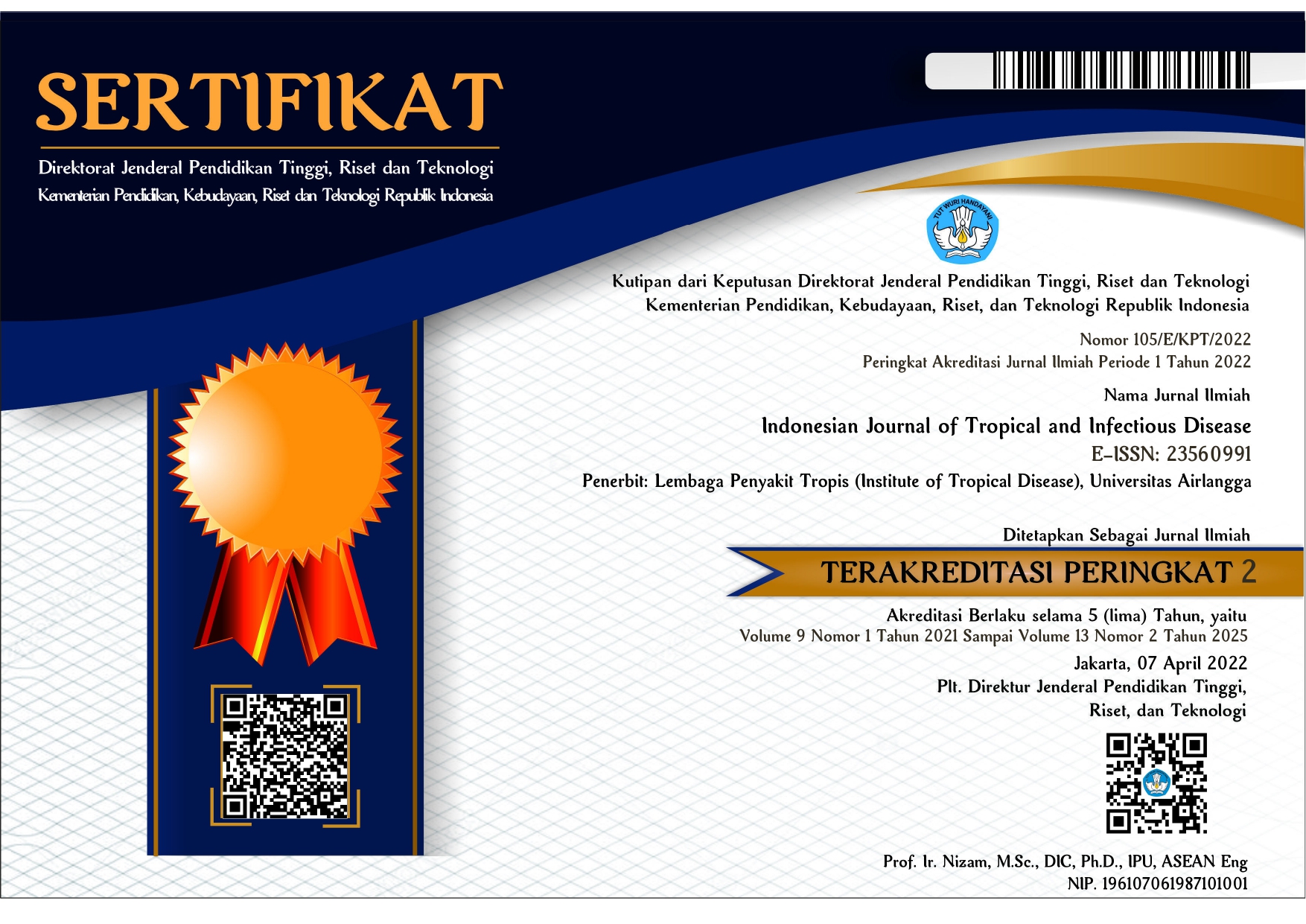Correlation Between Complete Blood Count Parameters with Procalcitonin in Immunogenomic Phases of COVID-19 Patients
Downloads
Coronavirus Disease 2019 (COVID-19), a global pandemic caused by SARSCoV-2, presents varying degrees of severity influenced by different immunogenomic phase. The immunogenomic phase that occurs in patients with COVID-19 is divided into three phases, namely the initial phase, propagating phase, and complicating phase. Severity disease progression can be monitored from the results of complete blood count (CBC) parameters and several inflammatory parameters such as procalcitonin. The purpose of this study was to investigate, during the immunogenomic phase of COVID-19 patients, the correlation between PCT levels and full blood count parameters. Patients treated at Dr. Soetomo General Hospital for COVID-19 were the subjects of this crosssectional study. Data analysis used in this study is Kolmogorov-Smirnov Test for normality, followed by Wilcoxon signed-rank test and bivariate Pearson correlation test to determine the correlation between complete blood count (CBC) parameters and PCT. Our findings reveal that most patients are male, predominantly aged between 50 and 60 years. Distinct variation of CBC parameters and PCT levels were observed in each phase. A significant relationship between these hematological markers, the immunogenomic phase and the progression of the disease. The PCT level of COVID-19 patients was associated with parameters of red blood cells, including hemoglobin, hematocrit, and the width-standard deviation of red blood cell distribution, leukocytes and their differential count, including lymphocytes and neutrophils, and platelets.. This analysis further understanding regarding the hematological dynamics in COVID-19 patients, providing important information about the pathophysiology of the disease and potential biomarkers for monitoring its progression.
Patel A, Jernigan DB. Initial Public Health Response and Interim Clinical Guidance for the 2019 Novel Coronavirus Outbreak — United States, December 31, 2019–February 4, 2020 [Internet]. MMWR Morb Mortal Wkly Rep; 2020 [cited 03 March 2025]. Available from: https://www.cdc.gov/mmwr/volumes/69/wr/mm6905e1.htm?deliveryName=USCDC_1052-DM19651
Afrin LB, Weinstock LB, Molderings GJ. Covid-19 hyperinflammation and post-Covid-19 illness may be rooted in mast cell activation syndrome. International J Infect Dis. 2020 Sep 10; 100:327–32.
Turk C, Turk S, Malkan UY, Haznedaraglu IC. Three critical clinicobiological phases of the human SARS-associated coronavirus infections. Europ Rev Med Pharmacol Sci. 2020; 24(16).
Sayah W, Berkane I, Guermache I, Sabri, M, Lakhal FZ, Rahali SY, Djidjeli A, Merah F, Belaid B, et al. Interleukin-6, procalcitonin and neutrophil-to-lymphocyte ratio: Potential immune-inflammatory parameters to identify severe and fatal forms of Covid-19. Cytokine 2021; 141: 155428.
Hu R, Han C, Pei S, Yin M, Chen X. Procalcitonin levels in Covid-19 patients. Int J Antimicrob Agents 2020; 56(2): 106051.
Shi J, Zhuo, Y, Wang TQ, Lv CE, Yao LH, Zhang, SY. Procalcitonin and C-reactive protein as diagnostic biomarkers in Covid-19 and non-Covid-19 sepsis patients: A comparative study. BMC Infect Dis. 2024; 24(1), 45.
Tong-Minh K, van der Does Y, Engelen S, de Jong E, Ramakers C, Gommers D, et al. High procalcitonin levels associated with increased intensive care unit admission and mortality in patients with a Covid-19 infection in the emergency department. BMC Infect Dis. 2022; 22(1), 165.
Kumar A, Karn E, Trivedi K, Kumar, P, Chauhan G, Kumari A, et al. Procalcitonin as a predictive marker in Covid-19: A systematic review and meta-analysis. PloS One 2022; 17(9), e0272840.
Omer I, Abuthiyab N, Al-Zaid N, Alkanani R, Abualnaja R, Khan G. Procalcitonin as a tool to antimicrobial stewardship in Covid-19 patients with superimposed bacterial infections: a systematic review. J Inflam Res. 2023; 6055-64.
Sysmex. XN-1000 Hematology Analyzer, 2023. Retrieved from https://www.sysmex.com/en-us/lab-solutions/hematology/xn-series/xn-1000
Chen N, Zhou M, Dong X, Qu J, Gong F, Han Y, et al. Epidemiological and clinical characteristics of 99 cases of 2019 novel coronavirus pneumonia in Wuhan, China: a descriptive study. The Lancet 2020; 395(10223): 507–13.
Garna H, Fernanda DR, Dirgavansya GB, Haerudin H, Zulmansyah Z, Surialaga S, et al. Clinical Characteristics, Comorbidities, Length of Stay, and Mortality of Covid-19 Patients in RSUD Cideres, Majalengka, West Java. Glob Med Health Comm. 2021; 9(3): 208–13.
Duarte FB, Lemes RPG, Duarte IA, Duarte BA, Duarte JVA. Hematological changes in Covid-19 infections. Revista Da Associação Médica Brasileira 2020; 66(2): 99.
Palladino M. Complete blood count alterations in Covid-19 patients: A narrative review. Biochemia Medica 2021; 31(3).
Henry BM, Benoit JL, Benoit S, Pulvino C, Berger BA, Olivera MHSD, et al. Red blood cell distribution width (RDW) predicts Covid-19 severity: a prospective, observational study from the cincinnati SARS-CoV-2 emergency department cohort. Diagnostics 2020; 10(9): 618.
Layla KN, Yeasmin S, Azad AB, Chowdhury MU, Sultana N, Rahman AFSMS, et al. Red blood cell profile in patients with mild, moderate and severe Covid-19. IMC J Med Sci. 2021; 15(2): 26–31.
Mao J, Dai R, Du RC, Zhu Y, Shui, LP, Luo XH. Hematologic changes predict clinical outcome in recovered patients with Covid-19. Annals Hematol, 2021; 100(3): 675–89.
Dhinata KS. Common Change of Complete Blood Count Parameters in Covid-19: a Literature Review Perubahan Umum Parameter Hitung Darah Lengkap pada Covid-19: Sebuah Tinjauan Pustaka. J Med Health, 2021; 3(2).
Bellan M, Azzolina, D, Hayden E, Gaidano G, Pirisi M, Acquaviva A, et al. Simple parameters from complete blood count predict inhospital mortality in Covid-19. Disease Markers, 2021; 1:8863053
Palladino M. Complete blood count alterations in Covid-19 patients: A narrative review. Biochemia Medica 2021; 31(3).
Samprathi, M and Jayashree, M. Biomarkers in Covid-19: An Up-To-Date Review. Front Pediat. 2021; 8 (607647).
Duarte FB, Lemes, RPG, Duarte IA, Duarte BA, Duarte, JVA. Hematological changes in Covid-19 infections. Revista da Associacao Medica Brasileira 2020; 66(2):99.
Lucijanic M, Krecak I, Soric E, Sedinic, M, Sabljic, A, Derek, L, et al. Thrombocytosis in Covid-19 patients without myeloproliferative neoplasms is associated with better prognosis but higher rate of venous thromboembolism. Blood Cancer J. 2021; 11(11): 189.
Urbano M, Costa E, Geraldes C. Hematological changes in SARSCOV-2 positive patients. Hemato Trans Cell Ther. 2022; 44(2): 218-24.
Tong-Minh K, van der Does Y, Engelen, S, de Jong E, Ramakers C, Gommers D, et al. High procalcitonin levels associated with increased intensive care unit admission and mortality in patients with a Covid-19 infection in the emergency department. BMC Infect Dis. 2022; 22(1).
Heer RS, Mandal AK, Kho J, Szawarski P, Csabi P, Grenshaw D, et al. Elevated procalcitonin concentrations in severe Covid-19 may not reflect bacterial co-infection Annals Clin Biochem. 2021; 58(5).
Gregoriano C, Koch D, Haubitz S, Conen A, Fux CA, Mueller B, et al. Characteristics, predictors and outcomes among 99 patients hospitalised with Covid-19 in a tertiary care centre in Switzerland: An observational analysis. Swiss Med Wkly 2020; 150(2930).
Hou H, Wang T, Zhang B, Luo Y, Mao L, Wang F, et al. Detection of IgM and IgG antibodies in patients with coronavirus disease 2019. Clin Translat Immunol. 2020; 9(5): e1136.
Violetis OA, Chasouraki AM, Giannou AM, Baraboutis IG. Covid-19 infection and haematological involvement: a review of epidemiology, pathophysiology and prognosis of full blood count findings. SN Comp Clin Med. 2020; 2(8): 1089–93.
Ballaz SJ, Pulgar-Sánchez M, Chamorro K, Fernández-Moreira E, Ramírez H, Mora FX, et al. Common laboratory tests as indicators of Covid-19 severity on admission at high altitude: a single-center retrospective study in Quito (ECUADOR). Clin Chem Lab Med (CCLM). 2021; 59(8): e326–29.
Odabaşı MS, Ozkaya G, Serin E, Akkuş A, Yilmas P, Sayan İ. Laboratory findings in predicting intensive care need and death of Covid-19 patients. Int J Med Biochem. 2021; 4(2): 7.
Copyright (c) 2025 Indonesian Journal of Tropical and Infectious Disease

This work is licensed under a Creative Commons Attribution-NonCommercial-ShareAlike 4.0 International License.
The Indonesian Journal of Tropical and Infectious Disease (IJTID) is a scientific peer-reviewed journal freely available to be accessed, downloaded, and used for research. All articles published in the IJTID are licensed under the Creative Commons Attribution-NonCommercial-ShareAlike 4.0 International License, which is under the following terms:
Attribution ” You must give appropriate credit, link to the license, and indicate if changes were made. You may do so reasonably, but not in any way that suggests the licensor endorses you or your use.
NonCommercial ” You may not use the material for commercial purposes.
ShareAlike ” If you remix, transform, or build upon the material, you must distribute your contributions under the same license as the original.
No additional restrictions ” You may not apply legal terms or technological measures that legally restrict others from doing anything the license permits.























